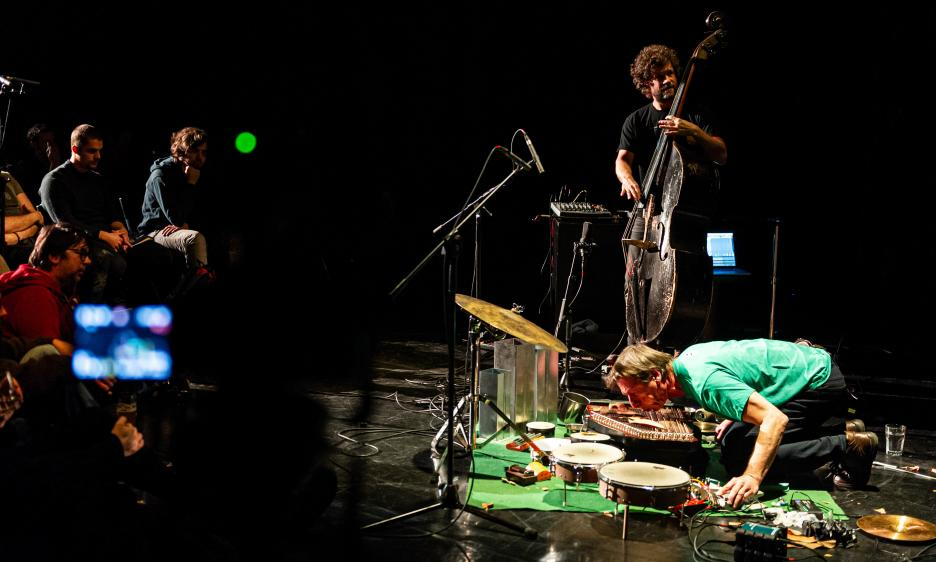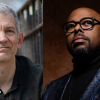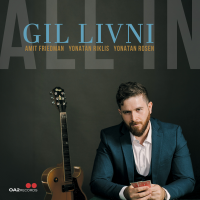Home » Jazz Articles » Interview » Zlatko Kaučič: The Discipline of Freedom
Zlatko Kaučič: The Discipline of Freedom

Courtesy Marcandrea
The real investment of time and energy was to understand who you are: whether a slave to music, learning 'systems' and putting yourself at their service, or a musician who wants to be free
—Zlatko Kaučič
All About Jazz: In recent years, you've shown remarkable productivity, releasing numerous recordings of improvised performances, often with longtime collaborators like Joëlle Léandre, Elisabeth Harnik, Agusti Fernandez and Barry Guy. Many of these works have been gathered into various box sets, most recently Inklings, released to mark your 70th birthday. These are fully improvised sessions, and almost always of the highest level. What is the secret behind the success of your improvisations?
Zlatko Kaučič: I couldn't say for sure! As you know, improvisation isn't the only field I work in. For more than twenty-five years I've been teaching in Nova Gorica, where I developed the Kombo project with my students—a music completely different from what I do elsewhere, though some people don't understand that. Maybe it's this openness to different forms of expression that makes those special moments possible.
AAJ: Tell us about the Inklings box set.
ZK: It is not the first project of this kind. Back in 2018, for my forty-year career anniversary, I released a five-CD set, Diversity (NotTwo). These collections allow me to share particularly meaningful concerts with a wider audience. To return to your first question, not all improvisations turn out well, but those with musicians with whom I share a deep connection—like Agusti Fernandez or Barry Guy, with whom I also share the cultural and musical experiences of the '70s and '80s—often reach a very special level. With my friend Agusti, for example, I've been working since those years, when I was living in Barcelona, playing in a club that hosted everything from Globe Unity to jazz greats like Tete Montoliu, just to name a few. That is where I began meeting and working with other major figures, some of whom I still play and record with today, or invite to my festival to give workshops for my students and for musicians interested in understanding their way of working.
For these workshops, I prefer to invite experienced musicians, partly because I know them well and what they can offer, and partly because in teaching, experience is even more crucial than virtuosity.
As for the four discs in Inklings, at first I wasn't sure about releasing them. I've been living with cancer for five years now, and sometimes that makes me overly critical. Still, I'm satisfied—especially with the recording with Fernandez and Guy at the Ljubljana Festival in 2022, a truly memorable concert. The others, yes, are "nice..." But I'm no longer all about "Me, Myself and I": I follow my heart, and so I'm taking advantage of this time while I'm still here on earth to release some of the countless recordings I've accumulated over the years that remain unpublished. I have amazing material with Paul Bley, Steve Lacy, Albert Mangelsdorff, but I don't think I'll release them because I don't want to exploit their names. Maybe for some of it I'll ask advice or authorization—for example, from Irene Aebi regarding Steve's music—but the rest, I think, will remain as it is. Perhaps someone else will want to do something with it after me.
AAJ: I agree, the disc with Fernandez and Guy is extraordinary, but I find the others to be much more than just "nice." The recording with Axel Dorner, in particular, struck me for its clarity of sound and rigor of development—details I hadn't fully caught when I heard that concert live. As for the historic material with musicians like Bley and Lacy, don't you think it would be a pity to leave it unpublished?
ZK: Thank you, but for me respect is essential. Among musicians, everything is about clarity and consent, especially regarding royalties. I know many labels overlook this, but I have no desire to do so. Some people have even asked me, but I'm not ready yet. And it is not because of the music's quality—often it is beautiful, and sometimes well recorded, like a concert with Lacy at Radio Capodistria, or one with Paul Bley and Paolino Dalla Porta in Maribor.
AAJ: How are you coping with your illness?
ZK: With serenity, accepting the limits it brings. Right now things are stable, though the medication causes side effects—like a mild feeling of dizziness. For example, in June I fell off my bicycle—my favorite means of transport—and broke a finger in two places. I took it lightly, thinking: "Good, two months of rest!" And by taking it that way, I discovered that with just my left hand I could do a lot of things I didn't know I could. Even accidents, like illness, can open up parts of life you wouldn't otherwise discover.
AAJ: Have you started playing again?
ZK: Of course! I've gone back to practicing, and soon I'll perform at Musica in Villa, the festival at Villa Ottelio Savorgnan, with music inspired by the poetry of Srečko Kosovel, together with my students. Then we'll present the project Pogum Pogumnih (Audacious Courage) at the Nova Gorica train station, in a concert reflecting on the past of Gorizia/Nova Gorica, the European Capital of Culture 2025, touching on themes of conflict and historical memory. The music will be similar to what we presented in the past at the Jazz & Wine of Peace festival, but with new extramusical references. I can't define the genre: it is my music, without labels.
AAJ: Your teaching activity has gone well beyond imparting musical theory and technique. It has created a true community of artists. Many of them are now established professionals, as well as active members of the collective that drives the initiatives you mentioned and the Brda Contemporary Music Festival itself. How is this aspect of your musical activity going?
ZK: In 2020, after my diagnosis, I decided to stop teaching—it had become too demanding. My students are like children to me, and when I see they're ready, I let them go their own way. I never wanted to create a traditional "jazz school." Today, if you want to learn jazz and develop technique, you can find everything on YouTube. Instead, I tried to teach how to play music—of any kind—fostering imagination and sensitivity. The most "technical" thing I taught was how to sit properly on the drum throne so you wouldn't end up with a broken back later on. Beyond that, I always tried to lead my students toward every kind of music, experimenting with rhythms—African, ethnic, modern, jazz—while making sure they collaborated, from 2005 onwards with Kombo A, alongside great musicians. We also played free, as we did in the '70s and '80s, but only in the end did I hand them the five books given to me years ago by Ben Riley, which contain everything one needs to "learn technique." Because technique is important—it is clear that without it you can't pick up a saxophone or a pair of drumsticks—but even more important is nurturing imagination and sensitivity to all kinds of sounds, so that you can ultimately develop a personal way of playing.
AAJ: And through teaching you also involved your students in your festival, which this year reached its fifteenth edition.
ZK: I never imagined we'd reach fifteen editions! The festival, dedicated to improvised music, poetry, and photography, takes place in Medana, among the vineyards of Brda. It is a non-commercial event, fueled by my students and attended by Italian, Slovenian, and Austrian musicians in search of new sounds. It's a showcase entirely devoted to improvised music, enriched by poetry and exhibitions, mostly photography. I chose a place close to home, Šmartno, among the vineyards and wineries, but I didn't think we'd get beyond four or five editions. Instead, thanks also to my students' help, we've carried on. Unlike most festivals, ours is organized by young people—I'm the oldest—and it isn't commercial, either in the music it presents or in the spirit behind it. That's why so many musicians—Italian, Slovenian, Austrian—who play different kinds of music come as listeners, to meet others like themselves who are always searching for new sounds.
AAJ: It is a rare festival: improvisation with no compromises, and a program that never panders to the market, focusing on leading European improvisers. I recall the first edition featured Evan Parker, then Phil Minton, Mats Gustafsson, Joëlle Léandre, Agusti Fernandez, Michael Moore, Per-Åke Holmlander, last year Frode Gjerstad and Iva Bittova...
ZK: I still remember the first-year concert with Evan and Giovanni Maier, who was so enthusiastic afterwards that he wanted to release the recording. But—to return to the difficulties I mentioned earlier about releasing recordings—Evan, who is very selective and doesn't even like playing with musicians he doesn't know well, never authorized its release.
AAJ: I carry with me a memory of that concert, which I often mention when I talk about improvised music and its surprising qualities: there was a moment when Parker was only producing reed pops, Giovanni was bowing not the strings but the edge of the bass, and you, kneeling on your "ground percussions," were crumpling an egg carton with your right hand and scratching a plastic plate with your left. It might sound hard to believe for who was not there, but it was so beautiful that I had chills down my spine! So much so that, at the end, I asked Giovanni what you had planned before the concert. He told me: "Half an hour before the start I went to ask Evan, but he looked at his watch and replied: it is too late to decide, we just get on stage and play!"
ZK: Yes, the festival was created precisely to share this kind of music. I had been thinking about it for a long time; then I received a national award for cultural merit in Ljubljana, which came with a grant of five thousand Euros. With that money, I decided to make it happen and to invite artists like Evan each year to lead workshops as well as perform. And we've continued that way ever since, under the banner of encounters between Italian and Slovenian artistic cultures—primarily music, but also poetry and photography. Of course, it hasn't always been easy to pull it off, because even finding just five thousand Euros, as at the beginning, is always a struggle. This year, with the Gorizia/Nova Gorica European Capital of Culture event, we were promised fifty thousand Euros, but we have not seen a cent... They preferred to give it all to electronic music or to headline jazz acts, even though everyone knows what I have done for this part of Slovenia over the years, a region repeatedly scarred by war and politics. In any case, one way or another, we still managed to scrape together what was needed.
Two years ago, Boris, the friend who was the soul of Šmartno, passed away. Šmartno is a beautiful village, encircled by medieval walls and perched atop a hill overlooking the whole Collio and the Brda, the Slovenian Collio. So we decided to move to Medana: perhaps the village is less picturesque, but it is still beautiful and right in the middle of the same wonderful wine country. And it has a historic cinema-theater, built in 1947 by workers in Tito's time, with excellent acoustics and welcoming spaces, where for three days we can be together discovering music in all its variety.
AAJ: Šmartno was—and remains—enchanting, but over the years, with Brda's economic growth, it had perhaps become a bit too chic to host something as informal and collective as BCMF. The impromptu jam sessions in the village corners had disappeared, and there was no longer space for gathering after the concerts or exchange ideas about artistic projects and beyond. In the two years in Medana everything became more communal, and the festival regained a "vintage" feel, I'd even say "Seventies," that makes the musical offerings easier to enjoy.
ZK: I agree. Improvisation has little room in traditional festivals, whether jazz or classical, perhaps because organizers don't really know it. But it is an immense treasure. Because it is not based on "systems," like other musics—including the various forms jazz has taken—but on freedom, on absolute listening, and on the will to enter into the very fabric of music. In improvised music there is no room for selfishness or egocentrism: unlike bebop, for instance, where rhythm supports the soloists, here there is attention, listening, empathy—sometimes it even requires you to remain silent, searching for new ideas and paths within what the others are playing. That is what drives you forward, not virtuosity or self-display! And note, I played mostly jazz, even bebop, for thirty years, in Spain, Portugal, and the Netherlands. And it was in the Netherlands, thanks to listening to so many fantastic musicians, that I realized we could—and had to—go beyond, that the real investment of time and energy was to understand who you are: whether a slave to music, learning "systems" and putting yourself at their service, or a musician who wants to be free—as Joëlle Léandre says, and she feels it intensely as a bassist—and therefore plays a free music that renews itself every time.
That is why in improvised music technique is important, yes, but it is not central. What matters is discovering your own voice and feeling free to use it. And it is a long journey—ten, twenty years—learning from others but never imitating them, never idolizing them. Because in what you play there must be your imagination, your intelligence, your sensitivity... in short, your voice, not someone else's. What we need to learn from the great improvisers is not their voice, but the simplicity and sincerity with which they use it, transforming it into fantastic music. That is why I wanted my students to experience working with them.
AAJ: I understand well, since I too have taken part in some workshops with improvisers. They usually don't teach technique or even correct technical errors, but instead try to convey a way of being together on stage—listening to others and serving the music. Joëlle, for instance, would often scold us forcefully, even raising her voice, when in her view we weren't bringing our body to the stage along with our head and instrument, or when we played too much. And she was right: to make this music work you need total presence, and more attention to creating space for others than to asserting yourself.
ZK: Exactly. I believe my students have found their footing, as you said, also thanks to the many improvisers they've been able to work with. And not only in instrumental workshops, but also in vocal ones, like the seminar a few years ago with Phil Minton, a fantastic musician who plays trumpet in any context and has focused his voice work entirely on improvisation.
AAJ: I remember that year, and I kicked myself for not joining the workshop when I saw the concert, because I had hesitated and then decided not to. It was an amazing performance, especially because it was clear that for some participants it was their first time trying voice.
ZK: That is the reason why I always urged my students to join any workshop with these musicians—there is always something to learn. Some told me they had no voice, but I knew that even if you don't, a teacher like him will bring out the little you have and make you use it in ways you never expected.
AAJ: To conclude, tell us about your duo album with Flavio Zanuttini, Peace in Space (Folderol Records, 2024).
ZK: Flavio is an original trumpeter, far from the mainstream, inspired by Peter Evans. He experiments with timbres and sounds using objects like gongs and electronics, and he is a radical improviser, as shown in his solo works La Notte and Ginkgo . I really like him—he's stimulating to work with. We had collaborated before, but this was the first time just the two of us played together. Recording the album was great fun: we played around with the many spaces that opened up through dialogue and experimentation. But even more beautiful were the two concerts we managed to find—first at Udin&Jazz, then this year at Cerkno—where we gave a wonderful performance. Because in improvised music it's essential to get to know each other; once you do, things grow exponentially. It's a pity we haven't been able to do more concerts so far. But that's how it is: improvised music is an under-recognized treasure—and it's precisely for that reason that I'll always keep playing it and promoting it.
Tags
Interview
zlatko kaucic
Ludovico Granvassu
Inklings
Fundacja Słuchaj
Joelle Leandre
Elisabeth Harnik
Agusti Fernandez
barry guy
NotTwo
Tete Montoliu
Paul Bley
Steve Lacy
Albert Mangelsdorff
Axel Dorner
Paolino Dalla Porta
Pogum Pogumnih
Ben Riley
evan parker
Phil Minton
Mats Gustafsson
Michael Moore
Per-Åke Holmlander
frode gjerstad
Iva Bittova
Giovanni Maier
Flavio Zanuttini
Peace in Space
Peter Evans
La Notte
Ginkgo
PREVIOUS / NEXT
Support All About Jazz
 All About Jazz has been a pillar of jazz since 1995, championing it as an art form and, more importantly, supporting the musicians who make it. Our enduring commitment has made "AAJ" one of the most culturally important websites of its kind, read by hundreds of thousands of fans, musicians and industry figures every month.
All About Jazz has been a pillar of jazz since 1995, championing it as an art form and, more importantly, supporting the musicians who make it. Our enduring commitment has made "AAJ" one of the most culturally important websites of its kind, read by hundreds of thousands of fans, musicians and industry figures every month.

























